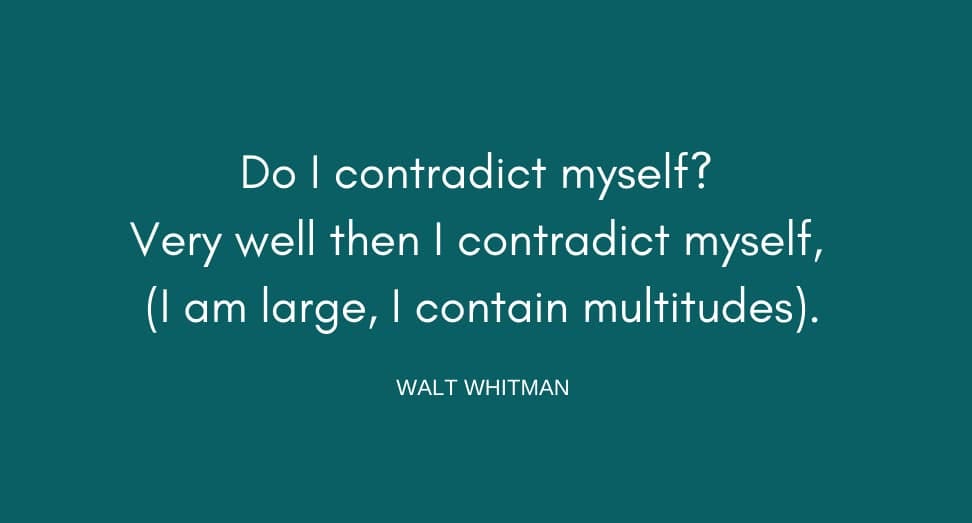In this video interview excerpt, Elizabeth Gilbert comments about the value to her of the work of Richard Schwartz, PhD on Internal Family Systems:
"I was captivated by it because I instantly recognized it as as accurate to my own lived experience. The way that I create...I mean [my book] Big Magic is all about this. I just didn't know that there was a model out there that had language for it.
But it's all about befriending and meeting and managing all these different aspects of yourself in order to be able to create."
[The kind of fuzzy image above is a screenshot from the video.]
This video is a just a short clip - Register free to see the full length video: “Creativity and Internal Family Systems.”
In a related article “What a Toxic Friend Taught Elizabeth Gilbert About Herself” she writes about the power of using this therapeutic approach:
“A few months ago, I found myself in a toxic situation with an old friend. For some mysterious reason, he had suddenly turned against me and would make snide comments to me every time we encountered each other.
I had no idea what to do. My response to his hostility was to disintegrate into total emotional confusion, which always happens to me during interpersonal conflicts. I became splintered and overwhelmed.
Part of me felt victimized and self-pitying, part of me felt like I was being oversensitive and should just shake it off, and part of me was so fierce with righteous indignation that I dreamed of taking the bastard's head off.
I simultaneously wanted to run away from my friend, totally forgive him, and mercilessly destroy him in a savage counterattack.
At first I wondered who all these rival voices in my head were, sending me such contradictory messages about how to feel and behave. And which voice represented my true self?
Thankfully, I was familiar with a concept that helped me understand why I was having so many different reactions at once.
I had discovered the work of a therapist named Richard Schwartz, PhD, who suggests that perhaps none of us is really a single unified self, but instead a compilation of many various selves. He calls these rival selves our "parts" and claims that they often work at cross-purposes.
We all understand this, instinctually. It's what you're referring to, after all, when you say things like "Part of me is excited, but another part of me is terrified," or "Part of me wants to quit my job, but another part of me craves the security of a regular paycheck."
Schwartz reassures us that containing all these different parts doesn't make us crazy; it merely makes us human. He also suggests that if we can identify and name the distinct parts of ourselves, we might have an easier time managing our lives.”
From article What a Toxic Friend Taught Elizabeth Gilbert About Herself, By Elizabeth Gilbert.
~~~~
Richard Schwartz, PhD explains more about IFS
“Going back at least to Walt Whitman’s famous line from Songs of Myself— “Do I contradict myself? Very well then I contradict myself (I am large, I contain multitudes)”—artists and philosophers have long observed that we regularly encounter many different selves within our inner world.
In a recent blog, bestselling author Elizabeth Gilbert put it this way: “None of us are really an ‘individual,’ per se, but rather we are each a teeming multitude of contradictory selves. There are parts of ourselves who are strong, parts of us who are vulnerable, parts of us who are angry, parts of us who are entitled. . . . This is what we mean when we say, ‘Part of me is really angry at you right now, even though another part of me completely understands the situation.’”
What most of us are less familiar with is that an essence exists within us that can embrace the full range of all our parts and help us achieve an inner harmony by recognizing the positive intentions of even the most critical and seemingly troublesome of these inner selves.
This innate core within us is what some people call our Buddha nature, soul, atman, and so forth. The problem is that too often this essence—what I call the Self—has been obscured by the protective parts of us that try to keep our lives on track in the mistaken belief that they know best.
Thus, the process of coming to a fuller experience of self-compassion typically begins with creating open space for this Self to come forward.
As a therapist, I’ve found that when I help clients access that core essence, they begin to feel compassion for parts that, even moments earlier, they were totally disdainful of."
From profile for article:
"Richard Schwartz, PhD…developed Internal Family Systems in response to clients’ descriptions of experiencing various parts–many extreme–within themselves. He noticed that when these parts felt safe and had their concerns addressed, they were less disruptive and would accede to the wise leadership of what Dr. Schwartz came to call the “Self.”"
From article “Facing Our Dark Side - Some Forms of Self-Compassion Are Harder than Others” By Richard Schwartz, Psychotherapy Networker.
~~~~
By Richard C. Schwartz:
audio program: Introduction to Internal Family Systems
book: Internal Family Systems Therapy
~~~~~





